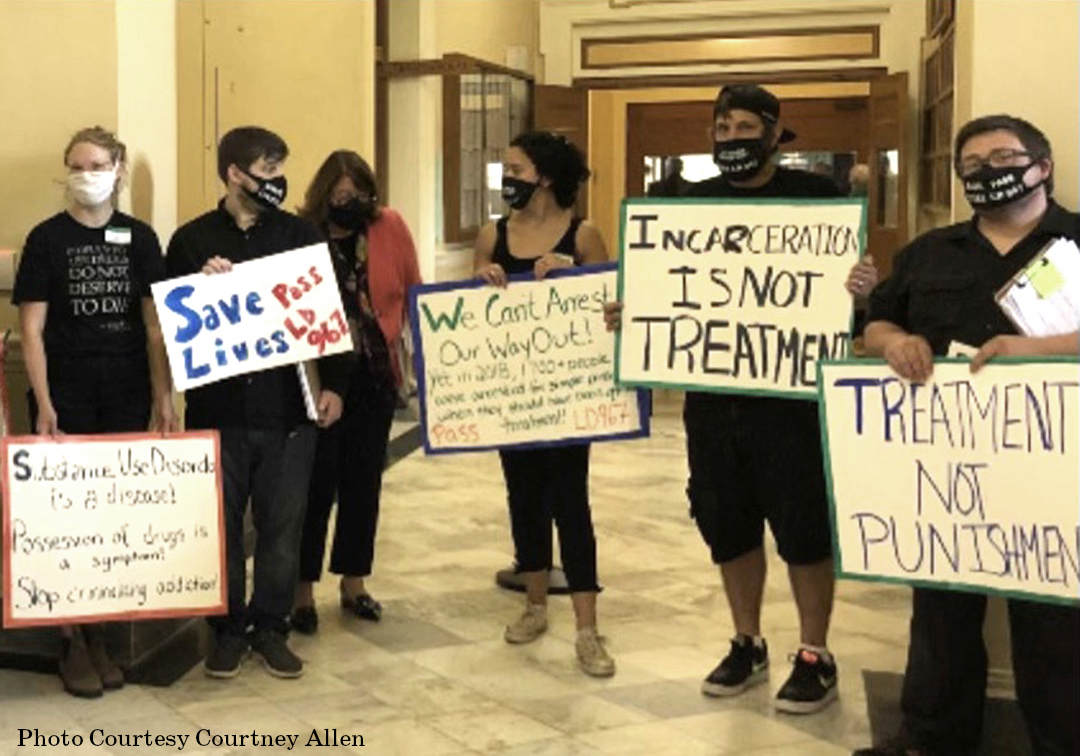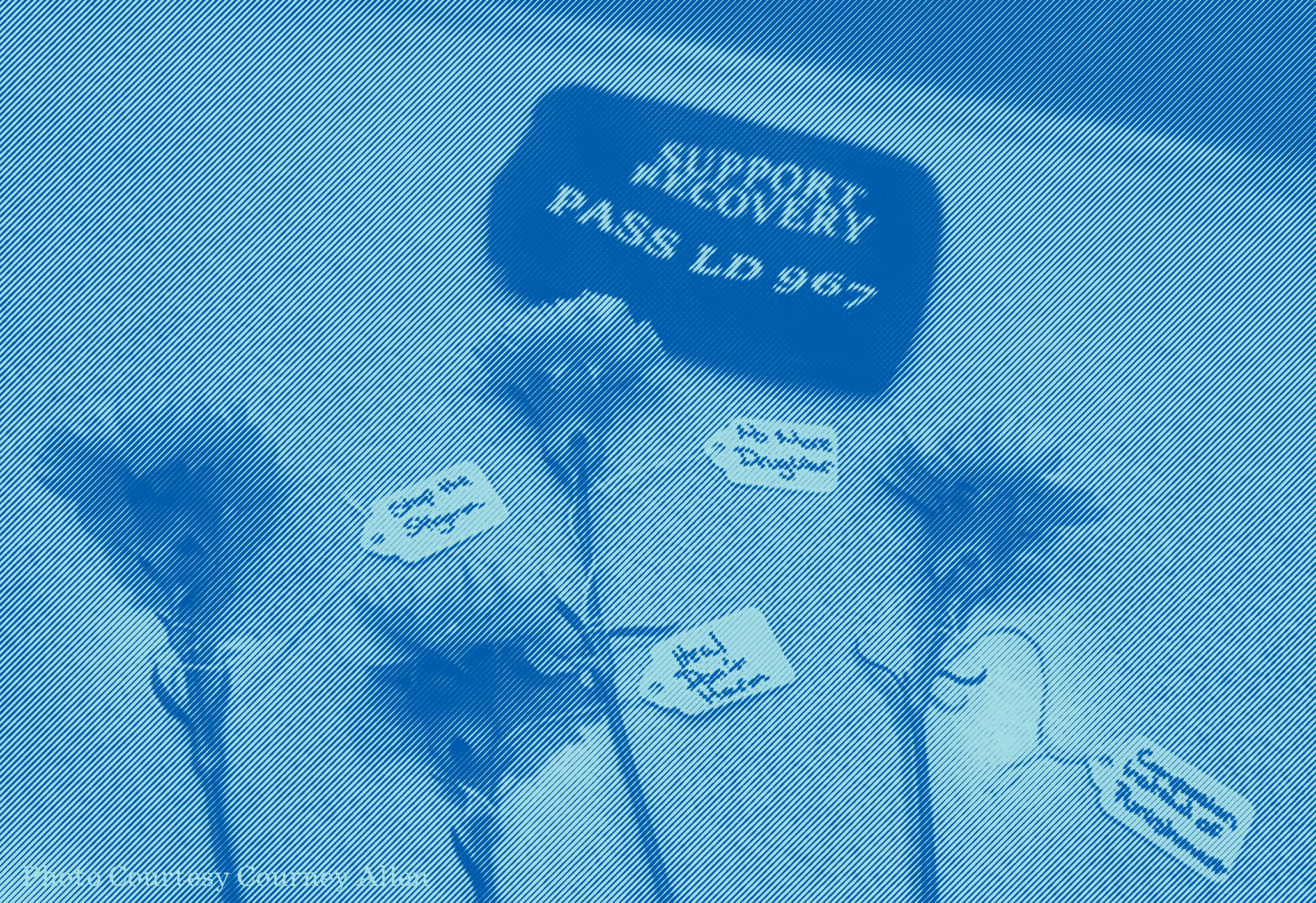Fighting Crisis with Care: Ending the War on Drugs
by Nena Burgess
Maine is experiencing a drug overdose death crisis. In 2020, Maine had a record 502 overdose deaths. But 2021 is already on track to surpass that, with nearly 200 suspected overdose deaths in just the first four months. That’s about 50 Maine people a month lost to drug overdose.

It is clear our punitive drug laws do not work. That’s why this year, drug policy reform groups and recovery advocates pushed an ambitious legislative agenda to change our drug laws to save lives.
Explore this blog for more information about Maine’s drug laws, ongoing state and national efforts to end criminal penalties for substance use, as well as information on how you can get involved in ending the failed War on Drugs.
Jump to a section:The Problem: Maine’s Drug LawsThe Solution: Drug Policy Reform National Drug Reform EffortsAction, Resources, Next Steps
THE PROBLEM
Prisons, policing, and punitive policies from our nation’s past and present limit paths to recovery.
Maine's Drug Laws
Maine drug laws need critical reform, so we aren’t using criminal punishment to address a public health need. Substance use disorder and overdose deaths are public health matters – and we need evidence-based, public health policies to address them.
Maine’s drug laws inflict serious punishment on people who possess small amounts of drugs for personal use, at least 1,500 people every year. A person caught with very small amounts of drugs for personal use can be charged with a misdemeanor, which carries up to a year of jail time. Repeated arrests, and possession of a larger amount than what is considered “personal use,” can be treated as felonies. Arrest and incarceration for drug possession create significant barriers to recovery, and the stigma of criminalization can discourage people from seeking help.
Ongoing War on Drugs
It’s been 50 years since President Nixon declared "The War on Drugs," introducing punitive laws and criminal penalties in attempt to reduce substance use and drug-related crimes. Nixon called drug crimes, “public enemy number one.”
Between 1980 and 2011, the number of people incarcerated for drug crimes increased by 1,100 percent, and the nation’s most systemically vulnerable communities continue to be devastated by disproportionate rates of incarceration for drug crimes. One out of every five incarcerated people is in jail or prison for drug charges, and 80 percent of those incarcerated for federal drug crimes are Black or Latinx, according to the Center for American Progress. Additional reseach from the Pew Foundation found states with greater populations of non-white residents had higher incarceration rates for drug crimes. This same study concluded that imprisonment is an ineffective deterrent to drug use.
The federal government has spent almost $1 trillion since 1971 waging the War on Drugs, and has no positive results to show. Punishing and incarcerating people for drug use has not decreased substance use, drug crimes or overdose deaths, but it has contributed to mass incarceration and racial disparities in the criminal legal system. Nevertheless, government funding continues to be directed towards failed drug criminalization policies. The bottom line is that criminalizing drug possession is a waste of federal and state resources that could be better invested in proven harm reduction and public health measures that keep people alive and offer a path to recovery.
Impact of Criminalizing Substance Use
People need treatment and support to enter sustained recovery, not arrest and a criminal record. - Courtney Allen, Maine Recovery Advocacy Project
Criminalizing substance use can have profound negative effects on a person’s quality of life, health outcomes, access to quality housing and education, as well as create inescapable cycles of harm.
- Landlords conduct criminal background checks, meaning a criminal record can bar from people from access to quality housing.
- Employers are also less likely to employ people with a criminal record, meaning chances for economic stability are limited, and low-income people are especially disadvantaged.
- Incarceration separates loved ones, including children who are more likely to experience worse health outcomes, depression, anxiety, and lack access to stable housing, and education when a family member is incarcerated.
People of color, especially those who are low-income, experience the impacts of criminalization disproportionately.
The criminalization of substance use intensifies while substance use continues to be a leading cause of death. According to a policy analysis by the CATO institute, drug overdoses accounted for more deaths than car crashes in the United States between 2000 to 2014. With lawmakers since Nixon calling for harsher sentencing laws, stronger enforcement mechanisms, and tough-on-crime policies, the War on Drugs has become a War on People, with criminalization at its core.
THE SOLUTION
Drug reform based on humane, effective, and evidence-based policies that reduce harm and promote recovery.

Drug Policy Reform in Maine
ACLU of Maine has long advocated for drug policy reform. Along with our coalition partners, including people in recovery and harm reduction advocates, we supported several priority bills to end the War on Drugs by reducing criminal penalties and reforming drug sentencing laws:
- LD 994 sponsored by Representative Genevieve McDonald (D-Stonington) removes criminal penalties for possession and exchange of hypodermic syringes, and other safer use supplies. LD 994 is a necessary public health-informed response to keep people alive, reduce infectious disease transmission and keep people out of jail. Recovery advocates, harm reduction advocates and the Maine Drug Enforcement Agency supported LD 994, and the Governor signed it into law.
- LD 1675 sponsored by Representative Rachel Talbot Ross (D-Portland), changes Maine’s harsh felony drug trafficking laws so that people can’t be charged and convicted based only on the amount of drugs they have. Because of Maine’s harsh felony trafficking law, many people who possessed drugs for personal use – with no intent to sell – could be convicted of felonies under the current system. A compromise version of LD 1675 became law this year.
- LD 967 sponsored by representative Anne Perry (D-Calais) would have eliminated criminal penalties for all minor drug possession. Instead of incarceration, those found in possession of drugs could pay a fine up to $100 or be referred to an evidence-based assessment of treatment options for substance use disorder. This bill a pathway to recovery and would avoid arrest and incarceration. LD 967 gained groundbreaking approval from the Maine House with a 77-62 vote. It also had overwhelming support from people in recovery, harm reduction advocates, health professionals, and recovery specialists. Unfortunately, the Maine Senate failed to advance LD 967 .
There is still more action to take, more policies to change, and more advocacy to be done. The legislative session has now come to an end and Maine has made significant progress towards change with two important drug reform bills passed. Although LD 967 fell short in the Senate, the fight to end the failed War on Drugs does not end here. The advocacy and public support demonstrated this past legislative session highlighted progress and commitment towards recovery and health, and away from punishment.
By telling lawmakers about our experiences, we have changed the conversation about how we should treat people with substance use disorder. - Mikki Rice, recovery advocate
There is a nationwide movement to reform punitive drug laws. Oregon became the first state, by popular vote, to end criminal punishment for drug possession. In addition to Maine, drug reform legislation has also been introduced in New York, Vermont, Maryland, Rhode Island, Washington, and Massachusetts within recent years. Ending criminal penalties for drug use and investing in treatment and harm reduction has also proven successful globally in Portugal and Switzerland.
ACTION, RESOURCES, NEXT STEPS
People are dying, prison populations are growing, we need an evidence-based approach that centers health and rehabilitation. Our current system creates barriers to well-being and recovery. With a record and rising number of overdose deaths in Maine, we need to take a stand in leading the nation towards treating substance use disorder as a public health crisis – not a crime.
Here’s how can you get involved in Maine.
1. Contact your representatives and lawmakers!
Tell them ending criminal penalties for minor drug possession matters to you.
- Click here to look up your local representatives.
2. Advocate!
- Click here for ACLU of Maine Advocacy Tools
- Write a letter to the editor in your local newspaper!
3. Connect!
Support our partners doing vital recovery and drug policy reform work in Maine.
4. Learn More!
Below are some great resources for learning more about Maine drug laws, state-wide drug policy reform, statistics on incarceration rates for drug possession, and data about overdose deaths in Maine.
5. Volunteer with ACLU of Maine!
Visit ACLU of Maine’s Volunteer Hub here for more information on how you can join and learn more about our statewide advocacy efforts.
